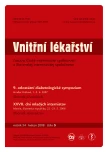The use of organ specific substrates in kidney disease in a diabetic patient
Authors:
Z. Zadák
Authors‘ workplace:
Centrum pro výzkum a vývoj Lékařské fakulty UK a FN Hradec Králové, vedoucí prof. MUDr. Zdeněk Zadák, CSc.
Published in:
Vnitř Lék 2008; 54(5): 472-474
Category:
Overview
Diabetic nephropathy is one of the principal causes of chronic renal failure. The disease prevailingly develops in men. The incidence of diabetic nephropathy doubled from 1991 to 2001. There are different traditional dietary guidelines for the different states of diabetic nephropathy, as well as pharmacotherapy options, and, last but not least, also modern ways of application of nutritional pharmacology. Organ specific nutritional substrates – amino acids, polyunsaturated fatty acids and other components of nutrition with pharmacological effects have become indispensable in modern care for diabetic patients.
Key words:
diabetic nephropathy – renal insufficiency – taurin deficit – organ specific nutrition substrate – branched amino acids – polyunsaturated fatty acids – carnitine
Sources
1. Teplan V et al. Metabolismus a ledviny. Praha: Grada Publishing 2000.
2. Zadák Z. Výživa v intenzivní péči. Praha: Grada Publishing 2002.
3. Hunt TK. Basic principles of wound healing. J Trauma 1990; 30(Suppl 12): S122–S128.
4. Albina JE, Gladden P, Walsh WR. Detrimental effects of an omega-3 fatty acid-enriched diet on wound healing. JPEN J Parentel Enteral Nutr 1993; 17 : 519–521.
5. Willet W et al. Am J Clin Nutr 1995; 61 : 1402S–1406S.
Labels
Diabetology Endocrinology Internal medicineArticle was published in
Internal Medicine

2008 Issue 5
-
All articles in this issue
- Haemocoagulation and renal insufficiency, haemocoagulation and type 2 diabetes mellitus
- Urologic surgery in diabetes
- Tumours of kidneys, urinary bladder and prostate in obesity and diabetes
- Bariatric surgery and the kidneys
- System rennin-aldosterone in fat tissue and other organ and tissues
- Diabetes, dyslipidaemia and kidney diseases
- Specific issues of dialysed diabetics in outpatient practice
- Specific aspects of peritoneal dialysis in diabetic patients
- Education of diabetic patients with chronic kidney disease and after transplantation
- Metformin and kidneys
- The use of organ specific substrates in kidney disease in a diabetic patient
- Nutrition for the diabetic patient with kidney disease
- Mucosal immunity with emphasise on urinary tract immunity and diabetes
- Visceral diabetic neuropathy of the urogenital tract
- Erectile dysfunction, its relation to diabetes and its management in 2007
- Epidemiology of diabetic nephropathy
- Examination of the kidneys in a diabetic patient
- Diabetes mellitus, hypertension and kidney
- Internal Medicine
- Journal archive
- Current issue
- Online only
- About the journal
Most read in this issue
- Metformin and kidneys
- Haemocoagulation and renal insufficiency, haemocoagulation and type 2 diabetes mellitus
- Specific issues of dialysed diabetics in outpatient practice
- Examination of the kidneys in a diabetic patient
